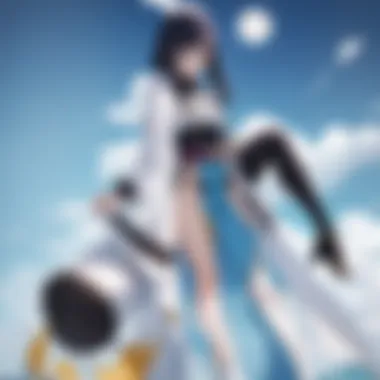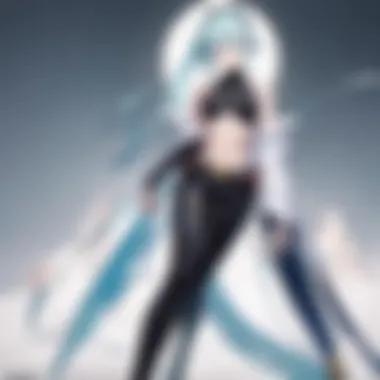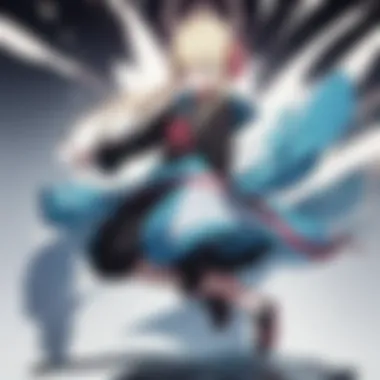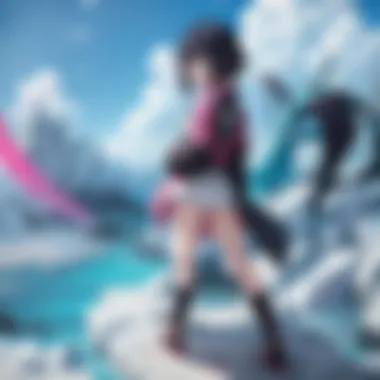Exploring the Final Episodes of Boruto: Key Themes and Impact


Intro
The concluding episodes of Boruto present a pivotal moment that can shape the analysis and perceptions of both character development and overarching themes. This section will offer a foundational understanding of the anime series, serving as a backdrop to explore the nuances in its finale. The essence of Boruto is not merely about the battles and techniques but about the evolution of its core characters and their relationships as the story draws to an end.
Anime Series Overview
Synopsis of the Anime Series
Boruto: Naruto Next Generations premiered in 2017, succeeding the legendary Naruto series. It chronicles the journey of Boruto Uzumaki, the son of the Seventh Hokage, Naruto Uzumaki. The narrative unfolds in a world where impact of the past decisions lingers in its contemporary landscape. Themes of legacy, friendship, and the challenges of being in the shadows of prominent figures are prevalent throughout. These episodes intertwine personal ambitions with broader social dynamics, evoking a sense of change while still honoring its illustrious predecessor.
Key Themes and Plot Developments
Throughout its run, Boruto delves into multiple themes, challenging the initial notions presented in Naruto. Some influential themes include:
- Legacy vs. Individuality: The pressure to live up to one's predecessors is vividly explored, especially through Boruto’s attempts to carve his own path.
- Friendship and Bonds: Relationships form the backbone of the series, illustrating the importance of cooperation and dialogue among characters.
- Itroduction of Technology: The series also embraces changing times, hinting on how new technologies affect traditional practices in a ninjutsu world.
Foreword to Main Characters
Boruto’s ensemble cast propels its narrative depth. Major characters include:
- Boruto Uzumaki: Initially rebellious against his father's legacy, Boruto undergoes significant character growth.
- Sarada Uchiha: As an aspiring Hokage, she grapples with her heritage and what leadership entails.
- Mitsuki: Exhibiting unique abilities and loyalty, Mitsuki adds mystery and depth to the group dynamics.
Animation Style and Soundtrack
The animation reflects a modern aesthetic, tying classic elements with new techniques. Notable fight sequences are complemented by their impactful scoring. By using energetic instrumentals and character themes, the soundtrack plays a critical role in emphasizing story arcs. While not all episodes deliver equal narrative weight, some stand as synergistic masterpieces, invoking emotional connections with the audience.
“The essence of Boruto lies in its exploration of characters breaking free from their inherited paths.”
Character Analysis
Main Characters and Their Motivations
High on relatability, Boruto brings intricate characterizations to life. Each protagonist faces distinct challenges:
- Boruto: Driven by pressure, he strives for acceptance while ultimately seeking his own identity even as his father's actions haunt him.
- Sarada: Torn between ambition and self-doubt, her potential leadership emphasizes the theme of self-discovery as she evolves.
- Mitsuki: As a synthetic human, he embodies questions on existence and loyalty, enriching narrative arcs involving both friendship and choice.
Character Relationships
Dynamics heavily influence both plot and emotional beats. The evolving relationships between characters prompt discussion around:
- Trust built among rivals.
- Right versus wrong decisions issued from friendship.
- Parent-Child relationships within the titular lineage.
Genre Spotlight
Specific Genre of the Anime
Boruto adheres to shonen conventions while distinguishing itself through modernization. It places heavier emphasis on character relationships and emotional resonance than mere physical combat.
History of the Genre
Shonen anime as a genre has elastically combined humor with action since the early 2000s. Major shonen titles creating benchmarks include Dragon Ball Z and One Piece, with their significance transcending conventional narratives to energize cross-genre dialogues today.
Behind-the-Scenes Insights
Production Process
The transition from manga to anime demands a delicate balance between storytelling, visuals, and pacing. Both producers and studios confronted several obstacles, including quality consistency, audience engagement, and market competition.


Well-documented changes towards the last episodes revived viewer interest. Utilizing constructive feedback, animators galvanized efforts for clear narrative coherence.
In reiteration, Fukuda Kazuki orchestrated the series’s direction, often addressing past complexities while embracing new arcs. An assessment of creative decisions will illuminate the finale's context.
Let’s observe how these concluding episodes can impact Boruto’s legacy and directions for possible narratives beyond this phase. The critical perspectives will further support our assessment in the following sections.
Prolusion to the End of Boruto
The conclusion of the Boruto series marks a pivotal moment in the narrative arc that has captured the attention of fans worldwide. In this section, we will explore the importance of understanding this finale and the specific elements that make it noteworthy. The end serves not only as the conclusion of Boruto's journey but also reflects the entire legacy of the Naruto franchise. Exploring this ending helps fans appreciate character growth, thematic depth, and plot resolution. It highlights transitions within the Naruto universe, engaging newcomers and veteran fans alike.
Overview of Boruto Series
The Boruto series began as a sequel to the immensely popular Naruto series. What started as Boruto Uzumaki grappling with the weight of expectations quickly evolved into a narrative exploring broader themes of identity, legacy, and the roles of modern ninjas. The series diverged into various storylines, introducing newer generations of ninja, complex antagonists, and powerful allies. Central to the plot was Boruto's relationship with his father, Naruto, and how their differing views on duty impacted their connection.
Critically, the Boruto series strived to integrate contemporary themes, such as technology's influence on the lives of ninjas. The conflict between tradition versus modernization became a recurrent motif. We see new characters embody these generational shifts, from Sarada Uchiha’s ambitions to Mitsuki’s understanding of purpose in life. Each character’s journey contributed to a richer Naruto lore and allowed for deeper diveragation into what it means to be a ninja today.
Significance of the Last Episodes
The final episodes of Boruto are crucial for several reasons. First, they serve as a culmination of various character arcs, marrying the old and new stories together in a coherent narrative thread. This process lays the groundwork for critical resolutions in relationships and character arcs that have been developing throughout the series.
Furthermore, the last episodes provide a necessary climax to the various plot points introduced in earlier episodes. They answer ongoing questions and uncertainties while placing emphasis on growth — both personal and martial. Key themes that originated from the very first episode find their echo in the finale, reinforcing the narrative cohesiveness of the entire series.
The audience's reception to these final moments has triggered discussions surrounding legacy. As Boruto concludes, it sets up expectations for future narratives within this rich universe, generating excitement among the fandom. Many ponder the direction the franchise might take next, and the questions surrounding opening avenues for potential spin-offs adds depth to the fan discourse.
The final episodes stand as a testament to both Boruto Uzumaki’s journey of self-discovery and a significant reflection of Naruto's enduring legacy.
By bridging the past with the present, the last episodes allow for a thoughtful meditation on growth, hardship, and a vision for the future perpetuated within an evolving ninja world.
Plot Developments in the Final Episodes
The final episodes of Boruto represent a critical juncture in the storyline and carry significant weight in understanding character transformations and thematic explorations. Several narrative strands converged as the series aimed to provide a satisfying conclusion for fans. Plot developments in these episodes are not merely a set of events; they are pivotal moments that culminate the story arc, showcasing the evolution of characters and their relationships with each other. They embrace critical issues tied with legacy, conflict resolution, and ultimately, hope for the future.
Key Events Leading to the Closure
In these last episodes, significant events shape the trajectory toward the series' end. Key happenings establish the stakes, serving as a lens through which the audience views character motivations and outcomes. First, Boruto Uzumaki faces formidable adversaries who challenge both his physical abilities and moral compass. Encounters with characters like Kawaki are essential; they reveal layers of complexity in terms of friendship, rivalry, and understanding one's place in the world.
Another important development is the exploration of the Ōtsutsuki threat, which has been persistent throughout the series. The final clashes lead to profound revelations that pivotally alter the characters' lives. As alliances shift and new revelations come to light, members of Team 7 come together in ways they had not previously, pushing them towards growth and unity.
Resolution of Major Conflicts
The resolution of long-standing conflicts stands at the forefront of the concluding episodes. A prominent arc culminates in a fierce battle where personal fears and expectations collide. Character arcs reach their breaking points, necessitating resolutions that at times provide catharsis and at others, leave lingering questions.
Key affronts between Boruto and providers of alternatives like Code creates a dichotomy demonstrating opposite approaches to following legacies. Realizations during these conflicts lead characters to redefine what it means for them to forge new paths moving forward.
Consolidation of themes regarding sacrifice emerges as both Boruto and his allies make tough choices that reflect their growth and evolving understanding of duty and responsibility.
Character Arcs in the Final Chapter
The final chapter offers a panoramic view of character arcs that are intertwined yet distinct. It encapsulates the growth of Boruto Uzumaki as he transforms from a hopeful yet impetuous child to a motivated individual willing to shoulder heavy burdens. He learns that legacy is not simply about expectations but about actions that define who one becomes.
Supporting characters enhance the narrative, further deepening our understanding of their roles. Figures like Sarada Uchiha step forward as leaders, not merely adhering to preconceived expectations but challenging norms and pushing their limits.
Moreover, antagonists find new layers too. Code, who once appeared single-dimensional, is fleshed out, exposing deeper motivations driving his actions. His outcomes contribute to the central message of how cycles of envy and empowerment can define one’s destiny as much as one’s choices do.
Character Development in the Finale
The character development in the finale of Boruto serves as a pivotal aspect of the series. Understanding how characters evolve is essential for grasping the nuances of the overall narrative. Development adds depth and emotional resonance to the storyline. In these last episodes, viewers witness profound transformations that offer insights into the characters' motivations and determine their paths. These dynamics not only highlight individual growth but also reflect broader themes prevalent in the Naruto universe. The dialogues and interactions among characters articulate the challenges faced and the growth both individually and as a community.


Boruto Uzumaki's Growth
Boruto Uzumaki's journey is not simply about becoming a skilled shinobi but also about understanding his heritage and identity. In the final episodes, his maturation becomes evident as he confronts his past actions and realizes their implications. He grapples with feelings of inadequacy stemming from being Minato's child and Naruto's successor. The contrast between his earlier rebellious attitude and the acceptance of responsibility enriches his character. This growth is integral to the concluding narrative.
Particularly, Boruto learns the value of teamwork, and sacrifices, showing significant leadership qualities. His dynamics with his peers, especially Sarada and Mitsuki, emphasize philosophical questions, allowing them to process the trials faced as a unit. Thus, Boruto's growth encapsulates the principle that individual skill must yield to collective effort.
Supporting Characters' Journeys
The supporting characters also have their own arcs that culminate in these final episodes. Sarada Uchiha comes into focus as she strives to become a competent leader. The narrative allows us to see her struggle with the duality of wanting power and dealing with the burden of the Uchiha legacy. Her interactions with Sasuke provide an emotional foundation for understanding what it means to bear a family's expectations.
Mitsuki's path diverges into self-discovery. The debates about his autonomity and purpose engage the audience. He must reconcile his nature against the ideals he embraces. Together, these characters amplify Boruto's development, as their journeys interweave gracefully into the culminating conflict, shedding light on themes of fandom loyalty and friendship.
Antagonists and Their Outcomes
The antagonists' outcomes are equally significant in carrying the finale's message. Figures like Kawaki showcase complex evolutions throughout the series. Kawaki's illusive nature and early antagonism serve to magnify themes of trust and betrayal. The inner conflicts between him and Boruto display how past traumas shape their personalities and actions.
Similarly, confrontations with figures like Code and the implications of their defeat reveal institutional requests for reform and change versus the chaos they introduce. The ripple effects from these characters challenge the ideologies the protagonists stand for, producing an environment ripe for growth across the spectrum.
Certainly, the character arcs in Boruto’s conclusion aim to impart valuable lessons about choices and transformation. During the character’s concluding arcs, personal associations only enhance their emotional impact. These narratives underline how even the bitterest journeys often lead to both forgiveness and solidarity.*
Themes Explored in the Finale
Exploring the themes present in the finale of Boruto illuminates the series' core messages and ethical dilemmas. Themes often resonate beyond the script; they speak to the human condition. In these last episodes, concepts like friendship and teamwork, the weight of legacy, and the cycle of conflict emerge sharply. Recognizing these themes allows viewers to engage more deeply with storytelling and character motivations. These histy themes are integral to both Boruto's journey and his peers'. They blend personal development with societal issues, enhancing the overall narrative.
Friendship and Teamwork
Friendship, alongside teamwork, is central to the Boruto narrative. Relationships forged through hardship enable characters to confront formidable foes. In the concluding episodes, the demonstration of collaboration is evident. Techniques and individual powers are utilized in unison, showcasing strategy and mutual respect.
The moment where Boruto and his comrades unite to face dangers is impactful. This unity reinforces the idea that strength derives from connections. Referentially, this speaks directly to young viewers about the stakes and rewards of friendship: success might become plausible with a supportive circle. The bonds as described are intricate and provoke a sense of relying upon others while also fostering accountability. Thus, friendships are not merely emotional but rather practical elements of survival.
Legacy and Expectations
Legacy significantly burdens Boruto, the son of Naruto Uzumaki. Each of the characters faces gender-specific expectations, matching familial lineage against personal ambitions. These expectations culminate in the finale, where Boruto reflects on his role and inherited ideals. He grows to challenge traditional notions about what it means to follow in one’s ancestor’s footsteps.
The weight of his father’s accomplishments requires Boruto to carve an identity—one that holds his uniqueness amid comparison. As Boruto wrestles with these expectations, viewers perceive a frenetic journey. The struggle embodies deep connections with growth and solidarity against these inherited pressures, hence creating introspection for long-time fans about character development.
“A true legacy is built upon the choices made today, not the notoriety of yesterday.”
The Cycle of Conflict
In these final episodes, the analysis of ongoing strife envelops the main characters. The cycle of conflict, again illustrated vividly, presents an in-depth reflection on how misunderstandings can be passed across generations. Battles clinch personal resolve yet simultaneously raise questions about the very continuation of adversarial engagements.
As Boruto reflects upon what it means to forge peace while navigating territories of violence, nuance unfolds. Decisions made in the name of preventing conflict can precipitate further battles, igniting repercussions that shroud the very foundation of peace attempts. These themes can resonate well with mature audiences, who see the mirrored nature of the conflict in real-world scenarios.
Boruto’s conclusion facilitates contemplation over violence and cycles—how can one break them, while fulfilling hope rather than despair? In turn, this dark introspection often leads to philosophical progress regarding peace, fostering conversations within fan communities.
Audience Reception of the Final Episodes
Understanding the audience reception of the final episodes of Boruto is crucial for comprehending the series' impact on fans and the broader anime community. The finale represents not just a narrative closing; it acts as a mirror reflecting the sentiments, expectations, and thoughts of viewers. Analyzing this reception provides insights into what the series has accomplished and what it has left behind, crafting a deeper dialogue around its legacy.
Critical Acclaim and Criticism
The last episodes of Boruto sparked a spectrum of responses from critics and viewers alike. Numerous segments were praised for their animation quality, pacing, and the emotional gravitas of key scenes. The final showdown sequences stood out, typical for a series rooted deeply in action and adventure. Critics acknowledged how certain characters, particularly Boruto, showcased significant depth and development, enhancing their connection with the audience.
However, the finale was not without its criticism. Some fans voiced disappointment regarding plot resolution speed and coherence. Out of this dialogue emerged popular discussions dissecting narrative choices, along with how well these choices aligned with the expectations set by prior arcs. Viewer frustrations were particularly pointed regarding certain unresolved threads that audiences felt deserved closure. Overall, audience discourse generates an interactive perspective that helps shape the series' historical view.
Key Points of Acclaim


- High-quality animation in key battles.
- Development of Boruto's character complexity.
- Emotional weight delivered effectively in final scenes.
Points of Criticism
- Fast-paced resolutions leading to narrative coherence issues.
- Followers wishing for closure in lingering plot threads.
Viewer Reactions and Trends
Viewer feedback has crystallized into various trends that reflect a community keen on analyzing its narrative structures and character development. Many fans took to platforms like Reddit and Facebook to express their thoughts on how the finale aligns or diverges from past storylines. Extensive discussions often centered around character arcs, emotional intensity, and potential implications for any follow-up initiatives or spin-offs.
The outpouring of reactions included enthusiastic support as well as stark critique. A growing trend reflected an awareness of how the legacy of Boruto could affect future narratives within the greater Naruto universe. As discussions continued, there became a well-defined split between those who appreciated final arcs versus those questioning several plot decisions, illustrating a rich tapestry of opinions and predictions.
On social media, hashtags related to Boruto trends soared, showcasing the engagement of fandom. The reliance on community conversations has transformed how anime narratives are consumed.
“The bond between viewers and the shows is what ultimately defines the experience—Boruto proved challenging but engaging.”
Popular viewing behaviors highlight a thriving community yearning for dialogue. As the series concluded, these connected threads signal an evolving continuum in viewer expectation—a far cry from static audience engagement.
Implications for the Future of the Franchise
The conclusion of the Boruto series invites significant reflections on its implications within the broader context of the franchise. Highlights are obvious, but delving deeper reveals multi-faceted considerations that may influence where the storytelling might go next. As Boruto Uzumaki's journey reaches pivotal turning points, the foundation laid will likely serve as the scaffolding for future narratives, spin-offs, or continuations.
Potential Spin-offs and Continuations
In light of the series' finale, there is a growing anticipation among fans regarding possible spin-offs or direct continuations. Characters like Sarada Uchiha and Mitsuki, who have shown commendable development, are prime candidates for their own arcs. Their individual stories can unravel new perspectives on already-established themes.
Several potential angles could be explored, including:
- Sarada becoming Hokage: Mitigating her unique lineage while forging her identity.
- Mitsuki's human experience: Delving into his ninja path as he balances his heritage.
- Into the next generation: New characters evolving from Boruto’s continuity, possibly facing different threats or challenges that reflect societal changes in the ninja world.
The success of continuation greatly rests on the ability to cultivate relatable narratives while acknowledging longstanding lore.
Impact on the Naruto Universe
Boruto's conclusion is more than an endpoint; it's an evolution within the larger Naruto universe. The foundation of characters, conflicts, and relationships set in Naruto now stands juxtaposed against new revelations addressed in Boruto. The thematic richness developed across both series merits a meticulous study concerning unresolved arcs and character fates.
Key areas of impact within the Naruto universe include:
- Development of legacy characters: Naruto and Sasuke transition from heroes to mentors, spotlighting their influence on the next generation.
- Restructured philosophies: Reevaluating principles of teamwork, legacy, and power seen differently in Boruto.
- Iconic antagonists and societal frameworks: The effects of newly introduced villains manifesting modern societal dilemmas and personal growth are elements carried from Naruto yet resonate within Boruto’s conclusion.
As the bridge enlarges information on potential destinies of beloved stories, it frames entire narrative possibilities, drawing older fans and new audiences alike.
The conclusion of Boruto signifies a momentous juncture in the Naruto franchise, reshaping discussion, character experiences, and expectations for what lies ahead.
Ending
In this article, we have explored the final episodes of Boruto. These moments serve as a culmination of the series, spotlighting the intricate character arcs and themes that have developed throughout its run. The conclusion offers a rich tapestry of reflections that resonate not only with the events that transpired but also with the series' overarching narrative.
Final Thoughts on Boruto's Legacy
Boruto crafts a legacy intertwined with its predecessor, Naruto. An emerging theme is the tension between the expectation of destined greatness and the vivacious desire to carve one’s own identity.
Key aspects to consider include:
- Character Legacy: Boruto navigates his father's stature while grappling with personal ambitions.
- Evolution of Bonds: The finale highlights how the bonds formed throughout the series reveal stronger themes of friendship.
- Lessons Learned: Conflicts faced drive significant character introspection, showcasing respective growth.
The finale acts as a pivot for understanding not just Boruto's narrative, but also its impact on the broader Naruto universe. The resolve of past conflicts signifies the necessary growth for all characters involved. Ultimately, these final episodes frame a reflection on the next generation’s place in a far more complex world.
"The true measure of one’s legacy lies not in the trials faced, but how they are embraced and conquered."
As Boruto moves into future storytelling opportunities, potentially through spin-offs or sequels, the essence it has built will continue to resonate among fans. While some may view its conclusion as controversial or sudden, the narrative threads offer an opportunity for exploration and expansion that aligns closely with Naruto's values and philosophies.
In the grander scope, Boruto's legacy is one of redefines strength, urges examination of expectations, and pivotal moves toward a fuller acceptance of multifaceted identities, underscoring the animating force of growth amid conflicts.







